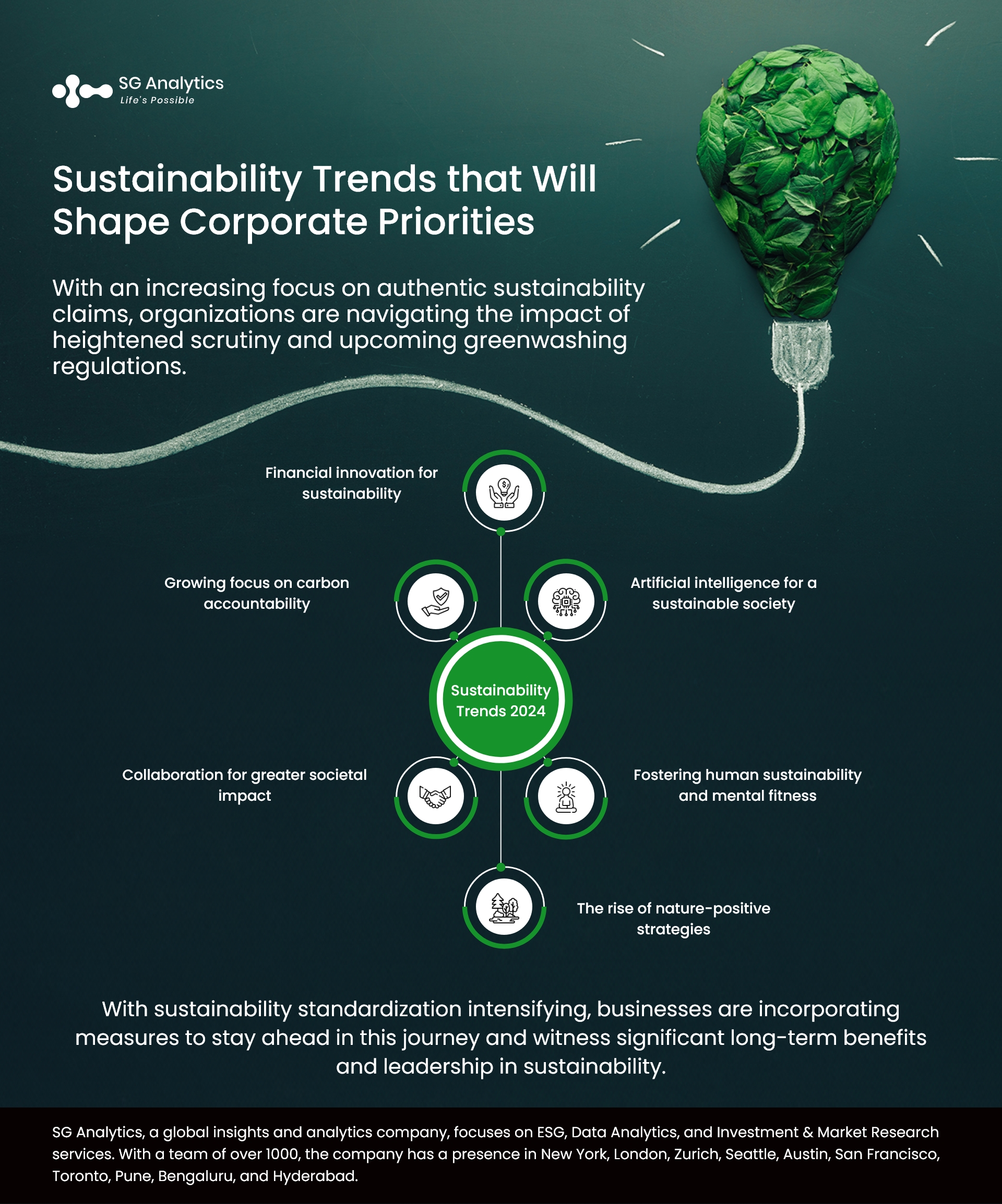In the dynamic business landscape of 2024, future-ready enterprises are positioning their sustainability framework at the core.
Sustainable business models are enabling businesses to converge profitability with societal impact. This is further driving entrepreneurship and innovation. Constant regulatory shifts are redefining legal drivers, compelling enterprises to comply and lead in the era of responsible corporate conduct.
Today, sustainability underlines the global nature of business transformation and implications beyond regional borders. These rising concerns are stressing the need for firms to engage in shaping non-market environments and managing geopolitical risks. The essential key to progressing industries with a sustainability framework is that businesses need to transcend their traditional boundaries to address multifaceted challenges, propel innovation, and disseminate best practices.
With a growing focus on inner development, organizations are realizing the need for leadership and its implications on personal growth. Organizations are catalyzing solutions to champion sustainability and foster a corporate culture of responsibility. They also acknowledge the interdependence between employee well-being and sustainable, high-performance organizations.
Read more: A Guide to Improving Environmental Sustainability in IT Infrastructure
Sustainability Trends 2024
The sustainability landscape is being driven by an unprecedented convergence of global environmental and regulatory shifts. With businesses integrating measures to reduce their carbon emissions, they are working towards shaping the sustainability landscape. This evolving landscape is emphasizing a shift to nuanced and pervasive activism. With various shades of sustainability gaining momentum, businesses are likely to face increasing pressure to reassess their strategies and align them with societal values and environmental preservation.

With sustainability trends unfolding, management teams are witnessing profound transformations. By understanding and navigating these trends, businesses are seeking resilience and relevance. It is also emerging as the key to building a legacy of positive impact and enduring success. Let's explore a series of sustainability trends that will assist businesses in driving priorities and transformation.
-
Artificial Intelligence for Sustainable Society
AI is increasingly being identified as a game-changer to nurture a sustainable future. In 2024, sustainability innovation trends will assist organizations in achieving their Sustainable Development Goals, addressing critical issues to ensure sustainability across all sectors, ranging from private entities to the global stage. AI is further elevating sustainable development. These tools help businesses achieve their sustainability goals. Using Generative AI, organizations can simulate environmental impacts caused by climate change.
-
Financial Innovation for Sustainability
Climate fintech represents the integration of fintech – a blend of finance and technology - and integrates communication systems across financial, banking, and investment industries. This is leading to the emergence of new practices. Innovative approaches are contributing to reducing the environmental impact of human activities by making financial activities less detrimental to climate change. Digital banking systems are further enabling consumers to carry out transactions using fewer resources, thus reducing the carbon footprint. The use of blockchain is further creating platforms to trade carbon credits, making organizational processes more accessible and user-friendly.
-
Growing Focus on Carbon Accountability
Business leaders are further monitoring these initiatives closely to signify the growing focus on carbon accountability and sustainability. By understanding and preparing for their impacts, organizations can maintain competitiveness in this shifting regulatory landscape. To achieve the set carbon-neutralization targets, industries are committing to innovation.

-
Fostering Human Sustainability and Mental Fitness
Organizational leaders are finding themselves amid global societal challenges with burnout and workplace stress. An organization that values its employee's well-being is integrating measures to create practices that help sustain productivity and well-being. Companies are also introducing sustainability initiatives to support the collective well-being of workers, such as flexible work arrangements and mental health support programs.
The varying success of current ESG initiatives is highlighting new directions for enhancement and growth. Initiatives need to be embedded in a supportive culture by leaders. Personalizing mental health support like burnout prevention and stress recovery will further help in increasing the effectiveness of solutions.
Read more: The Rise of AI and its Role in ESG Analysis for Innovation
-
Collaboration for Greater Societal Impact
Company relationships with stakeholders are constantly shifting. With consumers demanding more equitable products and organizations searching for new talent, there is a growing acumen with a sense of purpose. Communities are voicing their feedback on the organization's actions.
Industries, governments, and civil society are forging alliances to address the challenges of sustainability while propelling innovation and incorporating best practices. These changes in stakeholder relationships are further demanding authentic social engagement for true societal impact. As a result, organizations are resorting to simple solutions to meet minimal environmental standards. While these short-term measures can seem like quick wins, they often expose companies to risks, ranging from accusations of greenwashing to loss of reputation. Companies must act to seize opportunities for growth to stay ahead of the curve.
-
The Rise of Nature-positive Strategies
Momentum in ESG activities is growing in favor of nature-positive strategies for corporate. In 2024, companies are likely to face new regulatory disclosure requirements on the impact of their operations on nature, with the EU’s Corporate Sustainability Reporting Directive coming into force. Anticipating this, many enterprises are seizing the initiative to report their impact. Many are also preparing the first set of nature-related targets. However, accurately reporting and meeting nature-related targets will demand more nature-related data, and decision-making will require nature insights. New technologies are assisting businesses to fill these gaps and foster efficient analysis of data.

Leveraging Sustainability Trends for Competitive Advantage
For businesses, understanding and implementing sustainability trends in 2024 will not just be a matter of compliance but also a crucial factor for maintaining a competitive edge. Over the years, the ESG policy landscape has grown substantially, enabling companies to adopt these trends and proactively enhance their brand reputation. ESG practices further benefit from increased accuracy and reduced controversies.
Read more: How to put Sustainability and Innovation at the Heart of your Business?
With sustainability standardization intensifying, businesses are incorporating measures to stay ahead in this journey and witness significant long-term benefits and leadership in sustainability.
In 2024, organizations will likely witness a significant trend in biodiversity framework. These are further enabling them to highlight the need to assess, monitor, and verify trends in biodiversity loss and gain. By implementing clear measures in line with this approach, organizations are pursuing legal avenues and harnessing the power of sustainable solutions.
Navigating Sustainability Landscape in 2024
Organizations are gearing up to set the stage for a deep dive into the crucial 2024 sustainability trends. By unpacking the growing urgency for transparent environmental reporting and its implications, companies are working towards transforming their operations and aligning them with net-zero objectives to make sustainability a core business practice.

With an increasing focus on authentic sustainability claims, organizations are navigating the impact of heightened scrutiny and upcoming greenwashing regulations. By leveraging technology for stakeholder engagement, they are integrating cutting-edge technology to reshape stakeholder engagement in sustainability.
SG Analytics, recognized by the Financial Times as one of APAC's fastest-growing firms, is a prominent insights and analytics company specializing in data-centric research and contextual analytics. Operating globally across the US, UK, Poland, Switzerland, and India, we expertly guide data from inception to transform it into invaluable insights using our knowledge-driven ecosystem, results-focused solutions, and advanced technology platform. Our distinguished clientele, including Fortune 500 giants, attests to our mastery of harnessing data with purpose, merging content and context to overcome business challenges. With our Brand Promise of "Life's Possible," we consistently deliver enduring value, ensuring the utmost client delight.
A leader in ESG Services, SG Analytics offers bespoke sustainability consulting services and research support for informed decision-making. Contact us today if you are searching for an efficient ESG (Environmental, Social, and Governance) integration and management solution provider to boost your sustainable performance.
About SG Analytics
SG Analytics is an industry-leading global insights and analytics firm providing data-centric research and contextual analytics services to its clients, including Fortune 500 companies, across BFSI, Technology, Media & Entertainment, and Healthcare sectors. Established in 2007, SG Analytics is a Great Place to Work® (GPTW) certified company and has a team of over 1100 employees and has presence across the U.S.A, the U.K., Switzerland, Canada, and India.
Apart from being recognized by reputed firms such as Analytics India Magazine, Everest Group, and ISG, SG Analytics has been recently awarded as the top ESG consultancy of the year 2022 and Idea Awards 2023 by Entrepreneur India in the “Best Use of Data” category.









